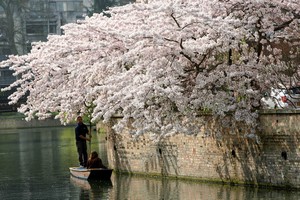 Cherry blossom is blooming FOUR WEEKS earlier in Britain this year thanks to the recent warm weather.
Cherry blossom is blooming FOUR WEEKS earlier in Britain this year thanks to the recent warm weather.
The sunny spring days have helped the beautiful pink and white buds open more than a MONTH early in parts of the country.
The spectacular blossom, which is usually associated with Easter, is already brightening up fields, woodland edges, parks and gardens across Britain. Experts believe the early blossom could even mean we are in for a bumper cherry season as the fruit will have longer to mature and ripen.
“The cherry blossom is a really magnificant sight and a great indicator that Spring has arrived,” said Dominic Price, a spokesman for the UK charity Plantlife.
“People usually associate blossom with Easter and it normally flowers in April but in some parts of the country it is four weeks earlier this year.
“The fact that the blossom has come so soon may also mean it will be a good year for cherries as it kick starts the whole process of forming fruit earlier.”
Cherry trees once covered tens of thousands of acres across the UK but over the past 50 years Britain has lost a massive 90 per cent of its orchards. The trees have suffered a particularly rapid decline and demise in the south of England.
“Native cherry trees are much more rare than they once were, but are one of our most spectacular Spring sights,” added Dominic.
“Although it's wonderful to see the blossom this early, nature'’s timetable is incredibly well choreographed and it is a slight cause for concern that a lot of the pollinators which the cherry trees rely on, such as honey bees, will not be around yet.
“It is a worry that the wind could blow the blossom off the trees before there are significant numbers of bees around to pollinate them.”
The Romans are said to have brought the first cherry to Britain from Persia in the 1st century AD, but it’s possible that wild cherries were already part of the country’s woodland. It is said you can trace old Roman roads by the wild cherry trees that grew up from the stones spat out by legions as they marched across the country. Cultivated cherry has been grown in Britain for hundreds of years and written evidence shows the existence of orchards in Medieval times in various towns.
The south and west of England soon became famed for their glorious cherry orchards with trees reaching dizzying heights of 60 feet or more. But sadly the height of the trees also contributed to the decline of Britain’s cherry industry as they made the fruit very difficult to pick. Cherry orchards were also lost in favour of growing other foods during the two World Wars.
Britain’s cherry industry then took a massive hit when Britain joined the EU and importing became easier. In Kent - known as the garden of England - there are now 85 per cent fewer cherry trees than 50 years ago and in Lincolnshire there are no cherry trees today. In Britain cherries have been used by communities as a source of raw, wild fruit and as an ingredient of preserves, pies and alcoholic drinks for hundreds of years.




